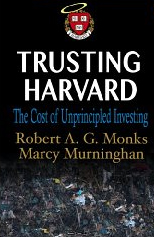
Trusting Harvard: The Cost of Unprincipled Investing *
New from Robert A.G. Monks and Marcy Murninghan, a book that addresses the gap between scholarhsip and university investing.
For decades, Robert Monks has promoted a simple idea: that property owners—even if the property is a share of corporate equity, or pile of funds to invest—have a civic moral responsibility for their holdings. At minimum, their obligation is to assure that no laws have been broken, no damage to others inflicted. More broadly, property owners have an obligation for active engagement, to assure positive performance and ethical integrity. That’s a form of citizenship that’s good for democracy, as well as capital markets. And it views “capital” holistically, connecting the stock and flow of financial, environmental, social, human, and other forms of capital because that’s how the real economy works.
These concepts of “stewardship”, “ethics”, “capital”, and “citizenship” are the pillars undergirding Trusting Harvard. In it, on the occasion of his 80th birthday and upcoming 60th Harvard reunion, Monks once again makes his argument to a Harvard President. Along with co-author Marcy Murninghan, he provides a framework for answering two questions: How can Harvard fulfill its fiduciary obligation as an investor in ways that advance its beliefs, values and commitments? How can Harvard take the lead in creating a curriculum for students, professionals, and the general public about the civic moral obligations of wealth? While aimed at Harvard, the issues covered are relevant to other universities and tax-exempt institutional investors, because they have a special duty to advance the public interest. In addition to fiduciary and curricular frameworks—the “myopic”, “ethical”, and “integrated” fiduciary; a tiered approach to gaining fiduciary knowledge and competence—a series of questions for trustees to ask are included. The result is a call to action to restore the social compact affecting universities and other public fiduciaries. That means moving away from a “house divided”, wherein fiduciary and program responsibilities reside in separate wings, to one wherein they are inextricably linked. And that’s good for everybody.
Look for updates, links and news at http://harvardwithlove.wordpress.com/about/
*previously called To Harvard with Love — Again
